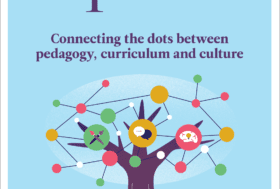Approaches to decolonising and diversifying the curriculum: Secondary film and media
This case study is part of a series of short online learning courses on decolonising and diversifying the curriculum. Chartered College of Teaching members can access this learning for free.
This is a case study from Module 4, ‘Approaches to decolonising and diversifying the curriculum’, of a series of 6 online courses. The module includes a variety of case studies about the principles and approaches that might underpin work to meaningfully decolonise and diversify the curriculum.
As you watch this case study video, consider how Dr Javeria Khadija Shah speaks about:
- Engaging creatively in this work when decolonising and diversifying the curriculum isn’t a part of the main discourse
- Resetting the narrative where erasure of marginalised stories and voices is commonplace
- Acknowledging our colonial past through the lenses of those affected
- Challenging dominant ideologies that represent a Eurocentric lens as the standard.
You need to be logged in to view this video
Hello. I’m Dr Javeria Shah, an interdisciplinary academic at the Royal Central School of Speech and Drama, University of London. My specialisms range from cultural sociology, policy, and education to film and media studies. Prior to my time in HE. I was a further education lecturer for approximately 10 years.
During this time, I taught film and media studies in different contexts, including BTech and A-levels. And I also specialised in teacher education. During my time in FE I worked incredibly hard at decolonising the curricula that I was teaching. And this went all the way from planning, to delivery, to assessment.
And it was a very difficult time to be doing this because it wasn’t part of the main discourse as it is now. And I found many, many blockades, many challenges to trying to… in trying to do that work. And quite often it meant taking quite a creative outlook on the way the specifications were designed and what they were asking us to do and finding ways around some of those challenges.
So I’m going to begin by just exploring what it means to decolonise before I go into the detail of my practice in FE. And just a little disclaimer, that the sharings I’ll make with you today are transferable, so they can be transferred to a secondary school context where there might be some media provision or film provision and similarly in HE where I currently teach screen studies. So I know that there are a number of universities that also do touch upon screen and film and media courses. So there are some transferable aspects to some of what I will be discussing today.
So let’s begin. What does it mean to decolonise? Well, decolonise essentially is us resetting the narrative. It’s exploring and examining the status quo, which is Eurocentric, where we have Eurocentric framings of history, Eurocentric framings of our imperial pasts, Eurocentric framings of individuals, peoples that did fall into those colonies and whose experiences are intrinsically interlinked with ours but have unfortunately been erased.
And I… perhaps I’m very conscious of this at the moment because of Remembrance Day where we do again and again see the Black and brown erased in terms of contributions to the world wars. So what we’re often finding then is that through that erasure of a colonial understanding, having a recognition of our colonial past, we find that we are often enacting the tropes and the ways of being and interacting, which continue to percolate as a legacy of the empires that we once held as nation states in the European context.
So to decolonise is first to acknowledge the colonial. We need to expand our understandings of what that past was, how it looked, and look at it through the perspectives of those affected rather than looking at it primarily through a singular lens. So once we begin that process of really understanding what that colonial past meant and going to… drawing on a range of different literature and contexts and lived experiences of people from that diaspora to really get a sense of how that particular identity on the peripherals of Britishness played out, it’s helpful for us then to use that to inform some of the work that we want to do with learners.
So the first step in decolonising is really to learn about our colonial past because we need to know what we are decolonising and what some of those damaging knowledge tropes are. We then need to take a step forward and start the process in ourselves because we are all socialised in particular ways. And inevitably we will have been enacting aspects of those colonial knowledge tropes through our behaviours, and interactions, and the way we design and deliver curricula.
So a good starting point is to start a process of decolonising one’s own self. And that’s a process of reflexivityReflexivity draws attention to the researcher, rather than p… More, which is an ongoing lifelong process. It’s not something that we can just engage with and then step out of.
And then once we’ve done that, we might then be able to look at the curriculum and try and really see where the gaps are and where we need to bring in those different perspectives, those different worldviews, and also challenge certain accounts of history and sociocultural contexts, and particularly challenge dominant ideologies, which uphold the Eurocentric lens as a universal lens and as a standard, which generates the kind of preferred knowledge. And that essentially is the underpinning implication in the way that the curriculum is currently designed.
So the approach that I take… and I’m going to use media studies in particular, although there are some transferable examples here to film. And I might draw on films studies at points as well. But with media, for example, the approach is really beginning by looking at what texts are being drawn on, and are those texts, a fair and accurate depiction of globalised phenomenon?
Are we adequately incorporating a range of different perspectives into the work that we’re doing with learners? Are we expanding our different reference points? Are we enabling students to be able to access a range of different worldviews, and perspectives, and cinematic, or media-based journeys and contexts?
Usually, what tends to happen… this was my experience… historically, we would form a specification perspective. Let’s take A-level specifications. I’ve worked with all the boards… AQA, OCR, WJEC. What would often happen is you would have a British, and American, sometimes a European context. But then you would have this very uncomfortable homogenization called world cinema, which completely erased the nuance and the specific contexts of specific nation states and their media production.
So a way around that would be to take a more nuanced approach, and to approach all examples in all contexts as potential insights rather than it being a universal standard. So one thing I do with screen studies, for instance, is when I’m speaking with learners and I’m introducing content, I do always tell them that British, and American, and European contexts will be treated as case study examples the same as other examples will be. So there is no universal standard per se.
So I won’t make huge claims like, the first ever this or the first ever that happened in Britain. Because the truth is that that requires a lot of research and confirmation. So when I’m designing the curriculum, I’m thinking about a range of different texts that I want to incorporate. And then I’m also thinking about how I might bring in a range of different theoretics as well.
So when I’m thinking, then, in the context of theoretics and key concepts within the subject area and how I’ve taught these, media is… we’re quite lucky with media studies in that we do draw on the work of the great Stuart Hall. And we’ll often draw on Gramscian ideas of hegemony. And we’ll related that to Stuart Hall’s sort of take on hegemony, in the context of… but particularly in the context of Britain and British representation in the media.
So what’s quite helpful, then, when we’re looking at hegemony… that could be a way of framing the colonial practice and allowing students to really question which parts of hegemonic interaction is colonial percolation, which still ends up resonating in society as dominant ideology? So my journey so far has been quite difficult because, as I said, when I first embarked on this journey, there wasn’t very much available in terms of support, or literature, or support networks around this work decolonising the curriculum.
It was a very new concept to many that I came across and that I spoke to about this. And quite often I did come up with a huge number of challenges. Teachers are often highly overworked, doing a huge amount of contact hours. And the idea of having to go back and revisit something, replan it, readdress it, reframe it can be quite a daunting task, especially if there is a formula in place where students have been achieving good results based on their existing formulaic approaches.
So I had a range of different challenges, but the outcomes were good with students. And students engaged better, especially the ones who were from marginalised communities. They felt themselves represented in the curricula. And they felt engaged. And they wanted to contribute a lot more than with some of the other content.
So I found that that did work and help in not only bringing cohorts together, but in terms of the knowledge production that they were doing, and then the outcomes for them in assessment. So this work continues. It has been for me for… coming up to 20 years. It’s not something I’m going to stop doing.
And every time I see a cohort, it takes a different shape. But essentially what underpins my commitment to this work, and the work that I want to do, is to ensure that we are expanding our worldviews, and everybody has a sense of belonging and can see themselves in the curriculum represented back to them, and that I’m drawing on some wonderful theoretical thinkers and wonderful contexts and texts to help draw that understanding together.
So good luck on your journey in decolonising the media curriculum. And I hope that you find some of the tips that I’ve shared today helpful. Thank you. Bye-bye.





